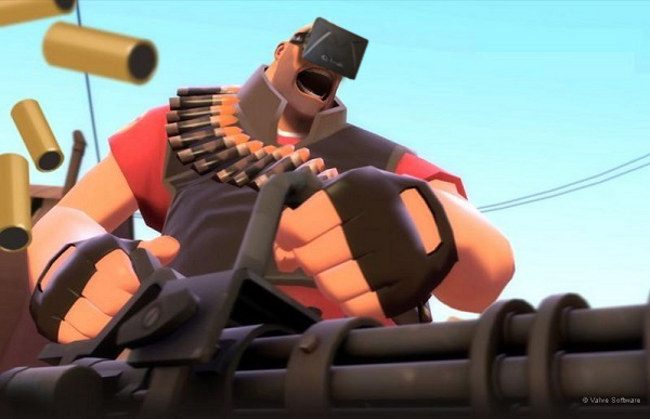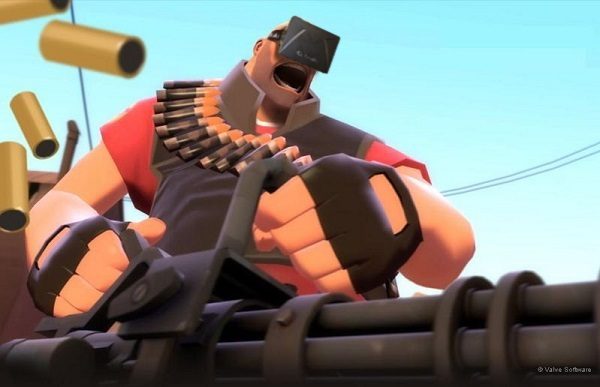Valve, the famous developer who has demonstrated a particular interest in virtual reality, has ported the ever-popular Team Fortress 2 for use with VR headsets. This confirmation comes from the Game Developers Conference (GDC) website which has announced two keynotes to be given by Valve employees; one of which will talk explicitly about a “virtual reality version of TF2.”
Joe Ludwig has spent time at HP and has now been at Valve as a programmer for more than three and a half years. Ludwig is a self proclaimed “augmented reality enthusiast” and is/was part of the TF2 team within Valve. Ludwig’s GDC talk is titled “What We Learned Porting Team Fortress 2 to Virtual Reality“:
DESCRIPTION: Several people at Valve spent the past year exploring various forms of wearable computing. The wearable effort included porting Team Fortress 2 to run in virtual reality goggles. This session will describe lessons learned from Valve’s porting experience. Topics covered include an overview of what stereo support entails, rendering 2D user interface in a 90 degree field of view display, dealing with view models and other rendering shortcuts, and how mouselook can interact with head tracking in a first person shooter. In addition to the lessons that apply to Team Fortress 2, there are also several lessons that would apply to any new virtual reality game. A game designed for VR could avoid many of the issues that came up with Team Fortress 2. These topics will also be covered.
TAKEAWAY: Attendees will learn what Valve learned from their effort to port Team Fortress 2 to virtual reality. A few tips will be included on adding stereo support to your engine, how to deal with user interface, and how to integrate head tracking with your input system. The talk will focus on concrete examples encountered during development of the virtual reality version of TF2.
INTENDED AUDIENCE: Any game developer who is interested in building virtual reality games or adapting existing games to virtual reality. The talk will be more about concepts than code, so no particular technical skill is required. Artists and game designers are encouraged to attend.
The other talk is by Miachael Abrash, who in recent years has been researching AR and VR at Valve, titled “Why Virtual Reality is Hard (And Where it Might be Going).” Here are the details:
DESCRIPTION: Augmented and virtual reality have been staples of science fiction for decades, and have been touted as “just around the corner” in the real world for much of that time. They’re back again, and this time they have a good shot at breaking through into the consumer space, thanks to the convergence of a number of key technologies, including projectors, flat-panel displays, waveguides, batteries, processors, wireless, cameras, computer vision, gyroscopes, and accelerometers. Nonetheless, a great deal of research and development is still needed, because the human perceptual system is remarkably sensitive to certain types of discrepancies from the real world, many of which are inherent in existing head-mounted display and tracking systems. This talk will look at one such discrepancy in some detail, review a laundry list of such issues, and discuss one possible roadmap by which augmented and virtual reality might eventually achieve their full potential.
TAKEAWAY: Attendees will come away with a better understanding of what the roadmap for augmented and virtual reality is likely to look like, and how much effort to allocate to augmented and virtual reality games over the next few years.
INTENDED AUDIENCE: This talk is for anyone involved with the creation of games who is curious about the possibility of a platform shift to virtual and/or augmented reality. There will be technical content involving head-mounted display hardware and its interaction with the human perceptual system, but no previous technical knowledge is required.
Valve and Oculus Rift

Valve has been very interested in Palmer Luckey and his Oculus Rift VR headset / head mounted display. Luckey met with Michael Abrash and the head of Valve, Gabe Newell, back in August prior to the Oculus Rift Kickstarter. Both Abrash and Newell offered personal endorsements of Luckey’s work in the official Kickstarter video.
While the GDC keynote info doesn’t explicitly mention the Oculus Rift, it’s a good bet that Valve has been using an early prototype of the Rift during the TF2 porting process and will likely have their hands on an early test-run version from the assembly line.
GDC 2013, where the keynotes will be given, is from March 25th to the 29th this year in California. The Oculus Rift developer kit is set to ship to developers in March as well. It’s possible that Valve will release the virtual reality version of TF2 during this time — it will likely support the Oculus Rift out of the box.
What Does it Mean for Virtual Reality Gaming?
If you’ve played any recent Valve games, you know that they are all based on the Source engine. If Valve has ‘ported’ Team Fortress 2 for virtual reality, it’s likely that VR support for other Source games, like Half Life 2, Portal, and Day of Defeat, isn’t far behind. It’s likely that Valve will release tools to help developers adapt third-party Source titles for virtual reality as well.
This might not be an announcement of a virtual reality version of TF2 that’s available right away, but it’s still very exciting. It’s clear that Valve wants to see VR games come to the market. Instead of doing quiet internal R&D and soaking up patents, they’re sharing the lessons they’ve learned with developers — big and small alike — so that others can benefit from their own research. Hopefully this means an accelerated path to virtual reality games in the consumer market. Good on Valve!
Source: The Verge








